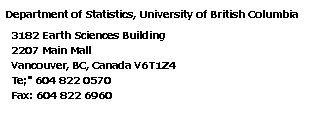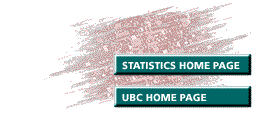 |
||
|
|
||
|
Statlab's Home Page || N. Heckman's Teaching Page || N. Heckman's Home Page || |
||
 Help with Technical Writing Nancy Heckman
Writing something well is hard work, involving many revisions and a lot of thought. But the more you edit your writing, the better you will be at writing it well with fewer revisions.
English technical writing has a very specific style. It is direct. Sentences are often short, to allow the reader time to process information before moving on the the next sentence.
The resources below may help you improve your writing. You should also solicit advice from faculty and colleagues. Someone else's comments on your written work are very helpful.
An article on scientific writing
A writing checklist
Scientific journal styles
Some journal guidelines are structural. For instance,
guidelines state
how long the abstract should be, how section numbering should
be done, where acknowledgements (e.g. to grants that supported you) should
appear.
Here is an example, for submitting papers to the Journal of the
American Statistical Association (Scroll down to "Preparing your Paper".)
(Possibly) Useful links
|
 |
 |